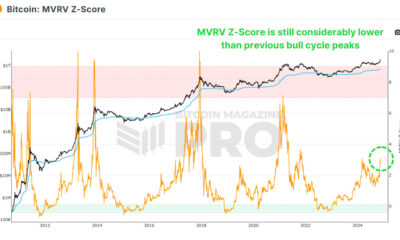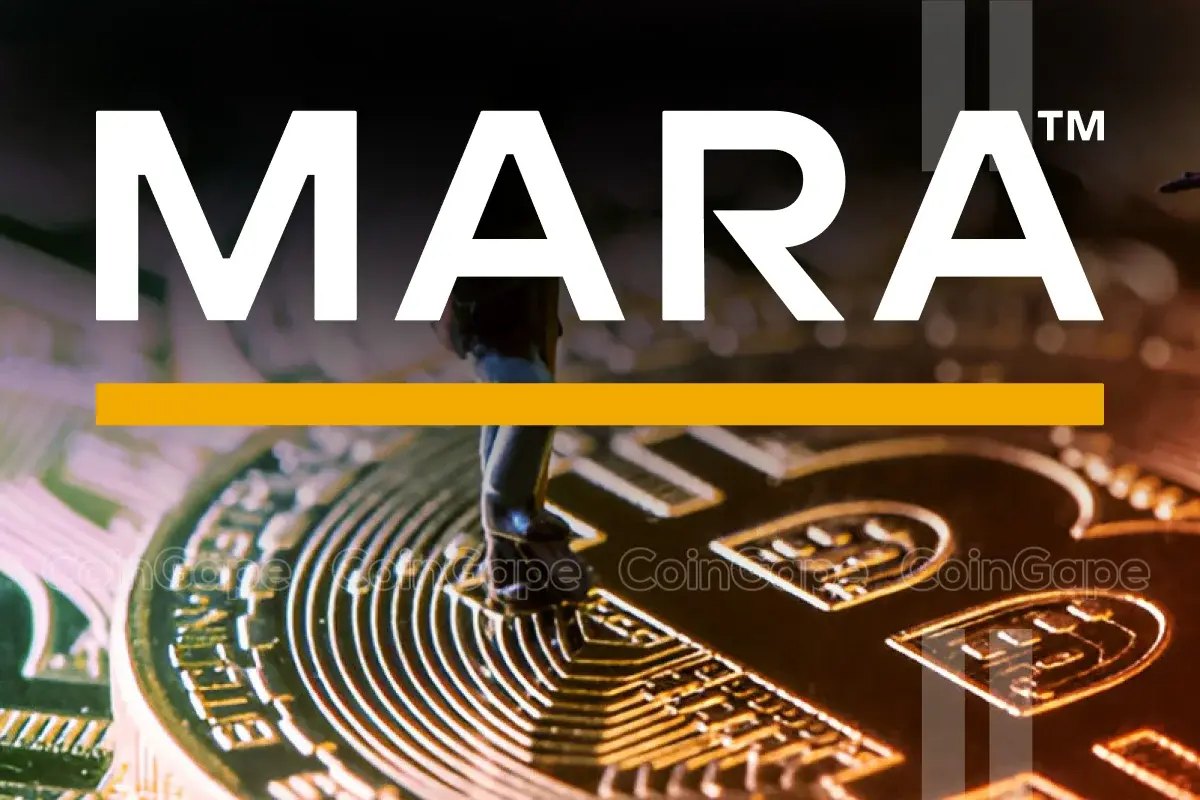24/7 Cryptocurrency News
Bitnomial Sues SEC Over XRP Futures, Cites CFTC As Primary Regulator
Published
1 month agoon
By
admin
Bitnomial, a cryptocurrency derivatives exchange, has sued the U.S. Securities and Exchange Commission (SEC) for jurisdiction over XRP futures contracts. This lawsuit is based on the SEC’s position that XRP futures are “Security Futures” and therefore it has the right to regulate. This legal action is taking place at the background of the already existing conflict between Ripple and the SEC over the status of XRP.
Bitnomial Sues US SEC Over XRP Futures
In August, Bitnomial sought approval to list its XRP-USD futures contract after a court decision in the SEC lawsuit against Ripple found that XRP was not a security in exchange transactions. Nonetheless, the SEC kept on insisting that XRP is a security, hence, Bitnomial’s legal proceedings.
The US SEC reached out to Bitnomial after the filing and claimed that XRP futures fall under the purview of both the SEC and the CFTC. The SEC also demanded that Bitnomial should register as a national securities exchange before it could offer XRP futures.
The cryptocurrency derivatives exchange disagrees with such categorization because it holds that XRP is not a security, and thus, the CFTC should be the only regulator to govern XRP futures just like it is with bitcoin and ether futures.
Ripple Vs SEC Case Fuels Broader Disputes
The matter of the status of XRP as security has been one of the key issues in the lawsuit between Ripple and the SEC. In July, a federal judge said that Ripple’s sales of XRP on exchanges were not securities, but institutional sales were considered securities. While the SEC has decided to appeal the decision, Ripple has filed a cross-appeal.
Bitnomial’s case forms part of the increasing list of legal battles that concern the SEC’s control over digital currency. According to Bitnomial’s CEO, Luke Hoersten, this lawsuit is significant not only for XRP but for all digital assets. He emphasized that Bitnomial is in a unique position, as it has not been accused of wrongdoing, to push for regulatory clarity.
Moreover, the CFTC currently oversees futures contracts for bitcoin and ether, which the SEC has acknowledged are not securities.
The cryptocurrency derivatives exchange has however argued that XRP futures should be treated the same way, with the CFTC having primary oversight. In its lawsuit, it is asking the court to declare that XRP futures are not securities futures and to prevent the US SEC from asserting jurisdiction over the contracts. The exchange believes that clearer regulations are essential for the cryptocurrency market to thrive.
Ripple CEO Take On Crypto Regulation
Ripple CEO Brad Garlinghouse has also condemned the SEC’s recent activities, especially after the SEC charged Chicago-based Cumberland DRW LLC with operating as an unregistered dealer in the crypto market. The SEC alleged that Cumberland conducted more than $2 billion in transactions classified as securities without proper registration.
Moreover, Crypto.com sued the regulator this week, accusing it of exceeding its mandate by classifying several tokens listed on the platform as securities.
This criticism is in line with that of SEC Commissioner Mark Uyeda, who has expressed concerns with the agency’s attitude towards cryptocurrencies. According to Garlinghouse, the SEC’s action against Cumberland is an example of overregulation of the industry, citing the lack of clarity on the laws governing cryptocurrencies.
Kelvin Munene Murithi
Kelvin is a distinguished writer with expertise in crypto and finance, holding a Bachelor’s degree in Actuarial Science. Known for his incisive analysis and insightful content, he possesses a strong command of English and excels in conducting thorough research and delivering timely cryptocurrency market updates.
Disclaimer: The presented content may include the personal opinion of the author and is subject to market condition. Do your market research before investing in cryptocurrencies. The author or the publication does not hold any responsibility for your personal financial loss.
Source link
You may like


On-Chain Data Shows The Bitcoin Price Bull Run is Far From Over


Trump Picks Pro-Crypto Hedge Fund Manager Scott Bessent for Treasury Secretary


Crypto millionaires will be made by April 2025: 6 coins to hold


Cardano Price Hits $1 But Analyst Says This Is Just The Start


Legacy Media’s Transformation: Why Evolution Beats Extinction


Massive Ethereum Buying Spree – Taker Buy Volume hits $1.683B In One Hour
24/7 Cryptocurrency News
Cardano Price Hits $1 But Analyst Says This Is Just The Start
Published
4 hours agoon
November 23, 2024By
admin
Cardano (ADA) has made a fantastic recovery as the token surged past the $1 price level for the first time since April 2022. ADA price has defied the bear trend by rising over 30% in the last 24 hours and is currently at $1.06. Similarly, trading volume increased by 150% to $6.7 billion suggesting increased market activity.
Nonetheless, experts claim that this has only begun, with some contributing on the projection of the future events. As ADA enjoys the bullish on-chain metrics, the question that continues to be asked is; where is ADA headed next?
Cardano Price Records 30% Surge to $1 Amid Bullish Metrics
After the recent crypto rally, Cardano price has grown by 30%, with a current price of $1.06 within 24 hours. The present value is the highest ADA has reached since April 2022. Trading activity also rose sharply with volumes going up by 150% to $6.7 billion in a single day.
More so, the crypto rally aligns with recent analysis predicting ADA price could cross the $1 mark this weekend. Analysts have suggested that the crypto is yet to fully realize its potential. Ali Martinez expressed optimism stating,
“$ADA has surged nearly 200% in the last three weeks! But that’s nothing compared to what is coming.”
As one of the leading crypto analysts, Ali Martinez claims that all that has happened with Cardano is a warm-up to even bigger gains. Martinez noted that ADA whales with stakes between $1 million and $10 million have seen their ADA holding rise by over 100% in the last month. This has resulted in large transactions exceeding $22 billion daily on the network, signifying robust accumulation activity.
From a technical standpoint, Martinez noted that ADA is mirroring its previous bullish cycle. If this pattern continues, ADA could aim for targets as high as $6. However, he emphasized that the $0.80 support level, where 1.2 billion ADA were purchased by 48,000 addresses, remains crucial for sustaining the current bullish trend.
On-Chain Metrics Show Strong Momentum
In addition, on-chain data underscores the bullish sentiment surrounding ADA. According to CoinGlass, Cardano price has benefited from a 34% increase in open interest, which now stands at $972 million.
Moreover, short liquidations have reached $9.77 million in the past 24 hours, indicating that traders betting against ADA’s rally were forced to close their positions. This forced buying pressure has further fueled ADA price growth during the ongoing crypto rally.
Additionally, data from Santiment highlights Cardano’s tripling market cap over the past 17 days. Concurrently, the crypto recorded $165 million in realized profits in a single day, the highest in eight months. More so, the data show Social media discussions about ADA have reached an 11-month high, underlining the growing interest within the community.


Another analyst, Dan Gambardello, noted that ADA’s trajectory over the past three weeks, which saw nearly 200% growth, mirrors its previous bullish patterns. He identified key support zones around $0.80 and resistance near $1.05, suggesting further upside potential.
Gambardello was also keen to point out that, based on this narrative, Cardano price could potentially have its sights set on a $10 target. This recent rally has triggered different analysts and investors weigh in on possible price targets ADA, ranging from $1.00 to as high as $15.
Ronny Mugendi
Ronny Mugendi is a seasoned crypto journalist with four years of professional experience, having contributed significantly to various media outlets on cryptocurrency trends and technologies. With over 4000 published articles across various media outlets, he aims to inform, educate and introduce more people to the Blockchain and DeFi world. Outside of his journalism career, Ronny enjoys the thrill of bike riding, exploring new trails and landscapes.
Disclaimer: The presented content may include the personal opinion of the author and is subject to market condition. Do your market research before investing in cryptocurrencies. The author or the publication does not hold any responsibility for your personal financial loss.
Source link
24/7 Cryptocurrency News
Bitcoin Miner MARA Buys Another 5771 BTC As Price Nears $100k
Published
8 hours agoon
November 22, 2024By
admin
Bitcoin miner MARA Holdings has expanded its cryptocurrency portfolio by purchasing an additional 5,771 BTC for $572 million. The acquisition was completed at an average price of $95,554 per Bitcoin, according to the company.
With its 0% convertible note offering, the company has achieved a 35% BTC yield per share and now owns a total of approximately 33,875 BTC, currently valued at $3.4 billion based on Bitcoin’s spot price of $99,000. This move follows Bitcoin’s ongoing rally, with the cryptocurrency nearing the $100,000 milestone amid increasing institutional demand and limited supply.
Bitcoin Miner MARA’s 0% Convertible Notes Drive Bitcoin Accumulation
MARA Holdings has leveraged its 0% convertible senior note offering to fund its Bitcoin acquisitions and other corporate activities. The company raised $1 billion from its latest offering, generating $980 million in net proceeds after fees and discounts. MARA revealed that a portion of these proceeds has been used to purchase 5,771 BTC at an average price of $95,554 per Bitcoin.
This recent acquisition reinforces MARA’s strategy to accumulate Bitcoin as a corporate asset. The company now holds approximately 33,875 BTC, solidifying its position as one of the largest Bitcoin-holding miners globally. In a statement, the company reported a 35% BTC yield per share, underscoring the financial benefits of its aggressive Bitcoin accumulation strategy.
By issuing zero-coupon convertible notes, MARA has been able to access funds without the immediate burden of interest payments, allowing the company to focus on expanding its Bitcoin reserves and scaling its mining operations.
Bitcoin Rallies Toward $100k
Bitcoin continues to surge, with its price reaching $99,742 earlier today and nearing the highly anticipated $100,000 milestone. This price rally has fueled optimism across the cryptocurrency market, with Bitcoin’s total market capitalization now surpassing $1.9 trillion.
Galaxy Digital CEO Mike Novogratz described Bitcoin’s price movement as “a big moment,” highlighting the resilience of the crypto community during volatile times. “Shoutout to the crypto community. You’ve endured years of uncertainty and headwinds,” he noted in a recent social media post.
The rally has been driven by several factors, including rising institutional interest, expectations of regulatory clarity, and Bitcoin’s upcoming halving event in 2024, which is expected to reduce supply while demand continues to grow. However, some analysts have warned of potential short-term BTC price corrections as the market faces increased leverage and speculative activity.
Marathon Digital’s Growth Strategy Mirrors Saylor’s Playbook
MARA’s latest Bitcoin purchase aligns with strategies popularized by MicroStrategy’s Michael Saylor, who has championed Bitcoin as a corporate reserve asset. Saylor has often advocated for accumulating Bitcoin during dips, leveraging corporate debt to acquire the asset for long-term growth.
MARA’s use of convertible notes to fund its Bitcoin acquisitions mirrors this approach. The company has strategically positioned itself to benefit from Bitcoin’s price appreciation, viewing the cryptocurrency as a store of value and a hedge against inflation.
In addition to acquiring Bitcoin, MARA plans to allocate funds from its convertible note offering to expand mining operations, pursue strategic acquisitions, and repay debt. This diversification ensures the company remains financially stable while increasing its exposure to Bitcoin’s growth potential.
Regulatory Developments and Institutional Demand Support Bitcoin’s Momentum
The increasing corporate interest in Bitcoin comes amid growing optimism surrounding regulatory clarity and the potential approval of a U.S. spot Bitcoin ETF. Spot ETF inflows are expected to make Bitcoin more accessible to traditional investors, further boosting demand.
Meanwhile, U.S. Senator Cynthia Lummis recently suggested that Bitcoin could play a role in reducing national debt over the next 20 years, sparking interest in its long-term economic potential. As institutional and corporate players like MARA continue to strengthen their Bitcoin positions, the cryptocurrency’s path toward $100,000 could serve as a catalyst for further adoption.
Kelvin Munene Murithi
Kelvin is a distinguished writer with expertise in crypto and finance, holding a Bachelor’s degree in Actuarial Science. Known for his incisive analysis and insightful content, he possesses a strong command of English and excels in conducting thorough research and delivering timely cryptocurrency market updates.
Disclaimer: The presented content may include the personal opinion of the author and is subject to market condition. Do your market research before investing in cryptocurrencies. The author or the publication does not hold any responsibility for your personal financial loss.
Source link
24/7 Cryptocurrency News
Solana Hits New ATH On Huge Whale Accumulation, More Gains Ahead?
Published
1 day agoon
November 22, 2024By
admin
Solana has once again caught the attention of market participants as it hit a new ATH on Friday. Notably, SOL witnesses a sustained rally against the backdrop of massive whale accumulations. Now, as the crypto is noting a buying pressure amid the bull market, market watchers anticipate further gains in the crypto ahead.
Solana Hits New ATH Amid Massive Whale Buying
According to data by Lookonchain on November 22, whales continue to accumulate Solana amid its upside movement to a new ATH. According to the data, a fresh wallet was recorded accumulating 42,443 SOL, worth $11.14 million, from Binance over the past two days. This accumulation was made by the wallet address “Au1VJ…q8hF8”, per Solscan’s data.
Simultaneously, another massive accumulation recorded over the past day has weighed the scales toward the bullish side of the asset. Lookonchain revealed that a whale bagged 100K SOL, worth $23.86 million, and staked it over the last two days. Notably, Solscan’s data showed this whale address as 7L1HBfMH.., while the whale’s SOL holdings totaled $55.58 million.
Overall, these accumulations, underscoring increased buying pressure on the asset, birthed significant market optimism on future price movements. For context, large-scale investors’ accumulations signaled heightened market confidence in the asset’s potential to offer gains ahead.
Moreover, with the soaring odds of a Solana ETF further weighing in, the current market sentiment for one of the leading crypto by market cap remains highly bullish. A recent CoinGape Media report further revealed that the SEC has now started engaging with the SOL ETF issuers regarding the filed S-1 registration statements. Besides, Bitwise has also filed for Solana ETF recently, further fueling market interest.
Coin Price Gians 8% Breaking ATH
SOL price today witnessed gains worth 8% intraday and was trading at $262.51 at the time of reporting. The coin’s 24-hour low was $237.33, whereas the current price level marked a new ATH. Notably, the weekly chart illustrated a 26% pump for the coin, followed by a monthly upswing of 59%. This bullish movement falls in line with massive buying pressure on the asset, as seen by the abovementioned whale transactions.
Simultaneously, Coinglass data indicated that the coin’s futures OI surged 15% to $6.01 billion. Moreover, the derivatives volume noted a 61% uptick to $19.03 billion. Overall, this stat indicated a burgeoning market interest in the asset, further paving an optimistic path for future price movements.
Also, a recent Solana price analysis by CoinGape Media pointed out that the coin eyes a $5,000 price target as it has already noted a significant surge from its 2023 lows. Crypto market watchers continue to monitor the token for further price action shifts in light of the abovementioned statistics.
Coingape Staff
CoinGape comprises an experienced team of native content writers and editors working round the clock to cover news globally and present news as a fact rather than an opinion. CoinGape writers and reporters contributed to this article.
Disclaimer: The presented content may include the personal opinion of the author and is subject to market condition. Do your market research before investing in cryptocurrencies. The author or the publication does not hold any responsibility for your personal financial loss.
Source link

On-Chain Data Shows The Bitcoin Price Bull Run is Far From Over

Trump Picks Pro-Crypto Hedge Fund Manager Scott Bessent for Treasury Secretary

Crypto millionaires will be made by April 2025: 6 coins to hold

Cardano Price Hits $1 But Analyst Says This Is Just The Start

Legacy Media’s Transformation: Why Evolution Beats Extinction

Massive Ethereum Buying Spree – Taker Buy Volume hits $1.683B In One Hour

Ethereum lags behind Bitcoin but is expected to reach $14K, boosting RCOF to new high

Bitcoin Miner MARA Buys Another 5771 BTC As Price Nears $100k

Jason "Spaceboi" Lowery's Bitcoin "Thesis" Is Incoherent Gibberish

Bankrupt Crypto Exchange FTX Set To Begin Paying Creditors and Customers in Early 2025, Says CEO

Top crypto traders’ picks for explosive growth by 2025

3 Tokens Ready to 100x After XRP ETF Gets Approval

Gary Gensler’s Departure Is No Triumph For Bitcoin

Magic Eden Token Airdrop Date Set as Pre-Market Value Hits $562 Million

Blockchain Association urges Trump to prioritize crypto during first 100 days
182267361726451435

Top Crypto News Headlines of The Week

Why Did Trump Change His Mind on Bitcoin?

New U.S. president must bring clarity to crypto regulation, analyst says

Ethereum, Solana touch key levels as Bitcoin spikes

Will XRP Price Defend $0.5 Support If SEC Decides to Appeal?

Bitcoin Open-Source Development Takes The Stage In Nashville

Bitcoin 20% Surge In 3 Weeks Teases Record-Breaking Potential

Ethereum Crash A Buying Opportunity? This Whale Thinks So

Shiba Inu Price Slips 4% as 3500% Burn Rate Surge Fails to Halt Correction

‘Hamster Kombat’ Airdrop Delayed as Pre-Market Trading for Telegram Game Expands

Washington financial watchdog warns of scam involving fake crypto ‘professors’

Citigroup Executive Steps Down To Explore Crypto
Mostbet Güvenilir Mi – Casino Bonus 2024

Bitcoin flashes indicator that often precedes higher prices: CryptoQuant
Trending

 2 months ago
2 months ago182267361726451435

 24/7 Cryptocurrency News3 months ago
24/7 Cryptocurrency News3 months agoTop Crypto News Headlines of The Week

 Donald Trump4 months ago
Donald Trump4 months agoWhy Did Trump Change His Mind on Bitcoin?

 News3 months ago
News3 months agoNew U.S. president must bring clarity to crypto regulation, analyst says

 Bitcoin4 months ago
Bitcoin4 months agoEthereum, Solana touch key levels as Bitcoin spikes

 Price analysis3 months ago
Price analysis3 months agoWill XRP Price Defend $0.5 Support If SEC Decides to Appeal?

 Opinion4 months ago
Opinion4 months agoBitcoin Open-Source Development Takes The Stage In Nashville

 Bitcoin4 months ago
Bitcoin4 months agoBitcoin 20% Surge In 3 Weeks Teases Record-Breaking Potential



✓ Share: